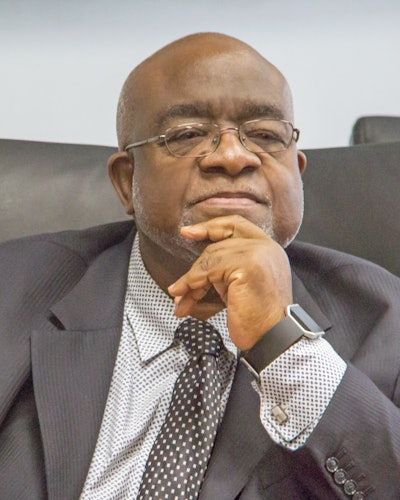DETROIT— If the nation is looking for ways to address issues that impact urban areas, they might consider closely examining the city of Detroit, said Dr. Curtis L. Ivery, Chancellor of the Wayne County Community College District.
Ivery convened the third Urban Summit here last week, bringing together national thought leaders, activists and journalists such as Randall Robinson, Leonard Pitts and Dr. Wil Del Pilar of The Education Trust for a national conference focused on integration, civic engagement and educational equity.
“Detroit is ground zero,” said Ivery, who presides over one of the largest urban community college districts in the nation. “It’s the epicenter for issues from concentrated poverty, transportation, civil rights, child care and equity in education.”
 Dr. Curtis L. Ivery
Dr. Curtis L. IveryThroughout the day, panelists discussed civic engagement, social equity and integration in education, policy and language.
The attack on urban communities is a direct result in the rise of White supremacy, said Dr. John A. Powell, who leads the University of California Berkeley’s Haas Institute for a Fair and Inclusive Society and holds the Robert D. Haas Chancellor’s Chair in Equity and Inclusion at the university’s law school.
“The fear of White anxiety is at the heart of what’s happening,” said Powell. “The future they’re afraid of is the pluralistic future. They see people who are different as an existentialist threat.”
Pitts, a Pulitzer Prize-winning columnist, said impact can be made vis-à-vis electoral politics and old-fashioned activism.
“Educate, advocate and then participate,” Pitts told the hundreds who converged in a ballroom at the MGM Hotel. “Rise up off your backsides and vote.”
For educators, issues such as food insecurity, transportation insecurity and the rising cost of a college education are priorities for urban community colleges.
“Today was an opportunity for us to get together and really refocus,” said Mawine G. Diggs, president of Wayne County Community College’s Eastern Campus. “This is professional development. We’ve come together as a collective to face the issues.”
Ivery, who has written extensively on the state of African-American males, said he has plans to produce white papers – authoritative and informative reports about complex issues – that will provide direction on next steps.
“There’s a call for action for sure,” he said. “We want something that we can memorialize and have for future discussions and considerations.”
On the policy front, Del Pilar said the Education Trust is tracking trends that impact urban education.
“Segregation of race and schools leads to disparities in funding,” said Del Pilar. “We believe that research and data should be the catalyst for action.”
Panelists discussed the importance of forging and strengthening alliances between colleges and industry.
Frederiek Toney, president of the Global Ford Customer Service Division, as well as vice president and corporate officer of Ford Company, said that 76,000 automotive technicians are needed every year for the next 10 years to meet the rapid shortage.
“While it’s important to focus on college education, not everyone wants one or needs one,” said Toney. “Let’s not forget about the importance of vocational education that’s championed by our community colleges.”
Dr. Kimberly Beatty, the chancellor of Metropolitan Community College in Kansas City, agrees.
She said more collaboration needs to take place between high schools and community colleges to “ensure that our students are not just college-ready, but are career-ready.”
She said community college presidents should develop academic boot camps to help graduating high school students freshen up their skills before they enter college.
“First, we have to stop the blame game,” she said, adding that preparing college students should be everyone’s goal. “We have to meet our students where they are and identify the barriers. We have a responsibility as community college practitioners that our high school students are ready.”
Jamal Eric Watson can be reached at [email protected]. You can follow him on Twitter @jamalericwatson



















